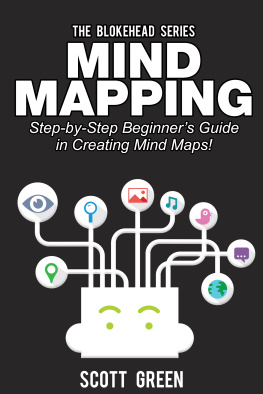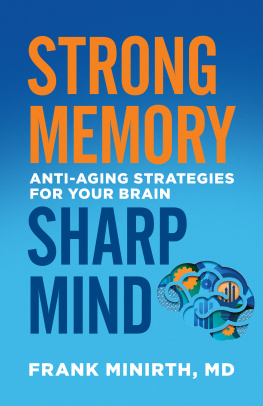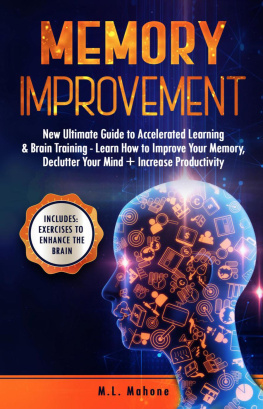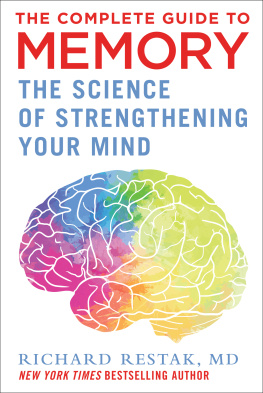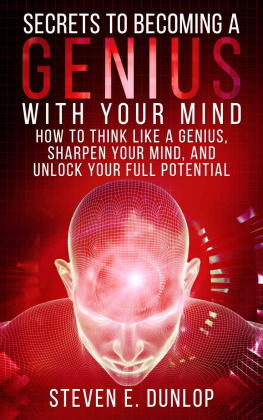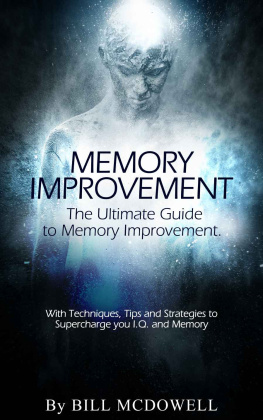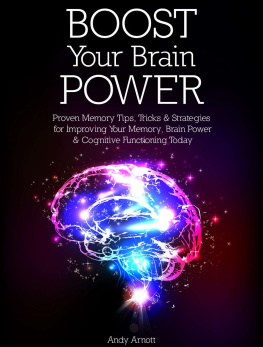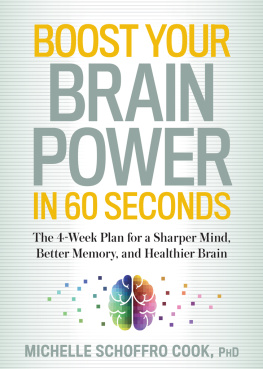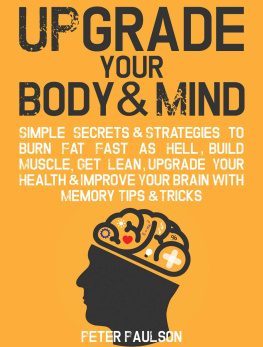How To Improve Memory - The Ultimate Mind Power Manual
The Best Brain Exercises to Improve Your Memory and Master Your Mind Power
By The Success Sculpting Coach
Copyright
Success Sculpting, Inc.
All rights reserved. Printed in the United States of America. No part of this book, including interior design, cover design and design elements, may be used or reproduced in any manner whatsoever without the prior written permission, except in the case of brief quotations embodied in critical articles and reviews.
For general information on Success Sculpting branded products, consulting, live events, speakers and services including custom versions of this manual or other products for your organization, please visit www.SuccessSculpting.com
Disclaimer and Limit of Liability
The publisher, author, and copyright holder (collectively, "we") have used our best efforts in preparing this manual and its accompanying live seminar and seminar recordings (collectively, the Work). Other than the use of our best efforts, we make no representations or warranties with respect to this Work. In particular, we make no representations or warranties with respect to the accuracy or completeness of the contents of this Work. We specifically disclaim any implied warranties of merchantability or fitness for a particular purpose. No warranties may be created by implication. No oral or written statement by us or any sales representative or other third party shall create any warranties. We do not guarantee or warrant that the information and opinions stated in this Work will produce any particular results, and we caution readers that the advice and strategies contained in this Work may not be suitable for every individual or business. We, individually or collectively, shall not be liable for any monetary loss, physical injury, property damage, loss of profit or any other commercial damages, including, but not limited to, special, incidental, consequential or other damages.
This Work is sold with the understanding that we, individually or collectively, are not engaged in rendering legal, accounting or other professional advice. If legal advice or other expert assistance is required, the services of a competent professional should be sought. Some names, characters, places, statistics and incidents used in sample advertisements and sample marketing copy are either the product of the author's imagination or are used fictitiously. Any resemblance to actual events, locales, organizations, data or persons, living or dead, is entirely coincidental and beyond our intent.
Be sure to check out The Success Sculpting Show Podcast

Visit the Show Blog @
www.SuccessSculptingShow.com
Download the Show in iTunes@
www.SuccessSculptingShowiTunes.com
TABLE OF CONTENTS
Chapter One: Introduction
As we drove by Starbucks one day, we couldnt help but chuckle. Starbucks Caf reminded us of two stories that weve tucked safely in our memory: one story is about a young fellow who is a ghost writer and likes to bring along his lap top to the caf where he could type away and gulp down mugs of his favorite cup of coffee Americano, he called it.
You cant blame me, its soooooo good, hed say, and we felt compelled one day to warn him not to leave his lap top unattended when he went up to the counter to order his Americano, and to be careful about not spilling his Americano into his lap top. A ghostwriter could not afford to lose pages of written work. It would be difficult to reconstruct what hes written. Even with a photographic memory, he could not re-create the original. Hed have to start all over again.
The other story is that of a book written by a Dr. Dharma Singh Khalsa which he appropriately titled Brain Longevity . He trained in Creighton University School of Medicine, Harvard Medical School and the University of California in San Francisco. He is a diplomate of the American Board of Anesthesiology and member and secretary of the American Academy of Anti-Aging Medicine.
In Brain Longevity , Dr. Khalsa talked about patients in their 40s and 50s who would come to his office in a state of anxiety convinced that they were sure candidates for Alzheimers. When he asked them why they believed that, theyd say that theyre constantly forgetting things, not able to digest a brief as easily as when they were younger, alarmed that they couldnt remember names, and regularly misplacing car keys. What worried them more, however, was the decline in their mental alertness.
One of his patients admitted, quite embarrassed, that his daughters soccer team asked him to stop being their referee because he was forgetting who last touched the ball when it went bouncing off. He was calling out scores that didnt make sense and his daughter, who was feeling the pressure from her team mates, had to ask him to give up his position as referee.
The frequent complaint was their fuzzy brains. Neurologists have a name for it. Its called age-associated memory impairment, a condition that is most common among people aged fifty and older. As Dr. Khalsa said, it is normal to lose brain capacity at 50 just as it is normal to experience diminishing eyesight at age 40.
It is a generation of frightened baby boomers, Dr. Khalsa says. All of a sudden theyre losing their endocrinological spark as their youth hormones dry up and sexual urges are flattening out. Theyre gaining weight, losing muscle and hair, and needing more and stronger coffee just to slog through the day. The boomers loss was Starbucks gain.
Grin and bear it, if we should, but an increasing number of scientists including Dr. Khalsa - believe that it is possible to defy the mental aging process. People in their 40s, 50s and 60s can have not only a perfect memory but also brain power.
The brain is a dynamic organ.
Individuals who get older can retain their youthful minds so that their learning ability, creativity and emotional vigor remain intact. They are able to sustain the mental dexterity and sharpness they need as they reach their 70s and 80s.
Charles M. Schultz, the famous Peanuts creator once said that life is like a ten-speed bicycle. Most of us have gears we never use. Well disagree with this dithyramb a little. Its not so much life having all these gears, but the mind. The mind possesses faculties that some people have not bothered about. Weve heard of cases where individuals with exceptionally high IQs consistently fail in life. We tend to dismiss them as intellectually lazy beings who never harnessed the full power of their minds.
Or else weve heard of the oft-repeated complaint, hes got all sorts of PhDs up his sleeve, but hes completely bereft of common sense.
The mind is a mysterious abyss.
What kind of mental make-up drives someone to open fire in a school cafeteria and shoot aimlessly at human beings with minds that one day would rule the earth? What happens to the creativity of a university freshman who decides to major in Quantum Physics even if his first love is music? How does a spelling bee champion remember the sequence of letters in a word like bacillus thuringiensis ?
Or, as the songwriter asked, why do fools fall in love?
That was quite a mouthful that Steven Pinker wrote in How the Mind Works (1997). His book had 565 pages (small characters), 565 footnotes plus our rough estimate of 380 references. His main thesis focused on the human mind and the theories of evolution and computation. No wonder he teaches at noble institutions like Harvard and MIT. How much gray matter does a man like Pinker possess? More importantly, would you date him?
Knowing his intellectual prowess, youd probably hesitate. Youd cringe in fear and dread to think that you could even engage in a mental sparring of sorts with him.
Next page

